The Easiest Birds to Care For: A Guide for Pet Enthusiasts
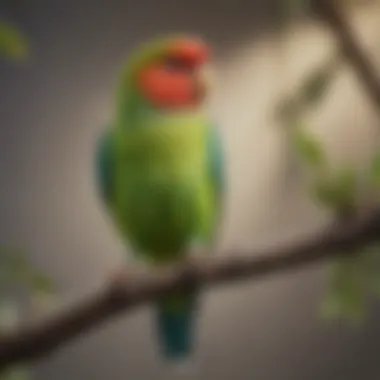
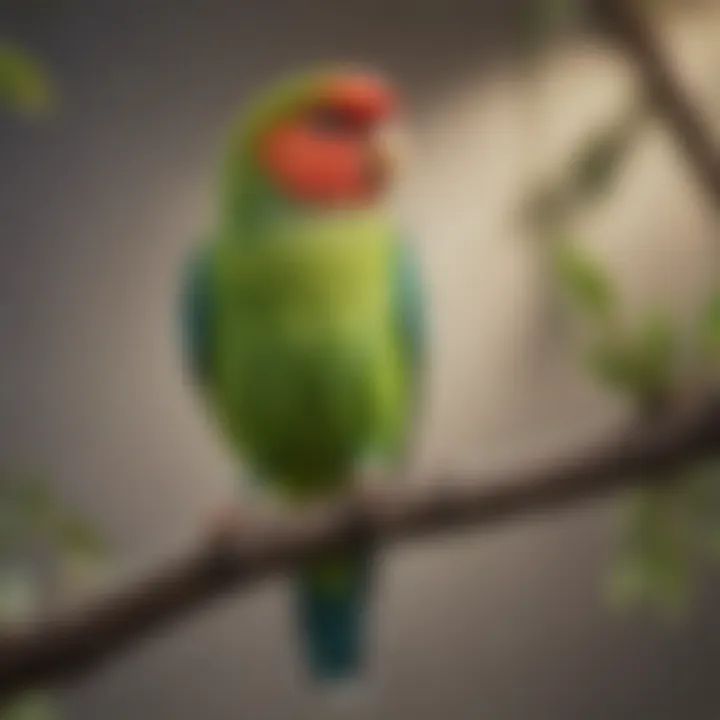
Intro
Choosing a pet bird can be an exciting decision for many, especially for those new to avian care. Birds can provide companionship, engage their owners, and brighten any home with their lively presence. However, not all birds are created equal when it comes to care requirements. Understanding which bird species are easier to manage is crucial for beginner bird enthusiasts.
This guide aims to highlight some of the most suitable bird species for novice owners. It provides a detailed examination of each species' temperament, care needs, and social behaviors. Additionally, we will offer practical advice on how to create a conducive living environment and cultivate a healthy bond with your feathered friend.
Understanding Your Pet
Selecting a pet bird requires an understanding of their behaviors and specific needs. Each species comes with unique characteristics that may influence their suitability as a pet.
Pet Behavior Basics
Birds, like other animals, exhibit various behaviors that are vital for their well-being. Knowing how they communicate and interact can enhance your experience. Common behaviors include calling, preening, and playing. Recognizing these can help in creating a supportive environment.
Common Breed Characteristics
Different bird species have distinct personalities. For instance, Budgerigars, often called Budgies, are known for their social nature and playfulness, making them ideal for families. Cockatiels, on the other hand, are often quiet and gentle, suitable for a more serene environment. Familiarizing yourself with these characteristics can aid in choosing the right bird for your lifestyle.
Species-Specific Needs
Every species has particular care requirements. For example, Parakeets predominantly thrive in social settings and require regular interaction. Lovebirds exhibit strong pair bonding and potentially need companionship from other birds. Assessing these needs is crucial for a harmonious relationship.
Understanding specific care needs can prevent common pitfalls that novice owners may encounter.
Pet Care and Maintenance
Once you have chosen a bird, maintaining their health and happiness is the next step. This section outlines key aspects of pet care.
Feeding Guidelines
Proper nutrition is fundamental for any pet. Budgerigars typically enjoy a diet comprised of seeds, supplemented by fresh fruits and vegetables. It is essential to avoid feeding them avocado or chocolate, as these can be toxic. Always provide fresh water and clean their food dishes regularly.
Grooming Essentials
Birds require grooming to maintain their health. Regularly check the condition of their feathers. Some species may need help trimming their nails, while others can manage on their own. Bathing opportunities can prevent feather dust and ensure they remain clean.
Hygiene Practices
Maintaining a clean habitat is vital. Clean the birdcage weekly, removing leftover food, droppings, and debris. Replace the bedding material and sanitize toys periodically to avoid the buildup of harmful bacteria.
Training and Development
Training your bird can enhance your relationship and ensure well-behaved pets. Here are some aspects to consider.
Basic Commands and Skills
Teaching basic commands such as
Understanding Feathered Companions
Birds can be delightful companions for those exploring pet ownership. Understanding the nuances of keeping these vibrant creatures is essential for potential bird owners. It goes beyond mere aesthetics; the bond you build with a bird can enhance your living environment and provide emotional rewards.
There are several benefits to keeping birds. They can bring joy through their singing and playful behaviors. Birds often require less space than other pets, which makes them suitable for various living situations, including apartments. However, careful consideration must be taken to meet their specific needs. This includes ensuring they have proper care, attention, and stimulation.
Ensuring the well-being of a feathered friend affects both the bird and the owner. A well-cared-for bird tends to be more social and interactive. That interaction can lead to a fulfilling companionship. It’s essential to note how the species characteristics impact the overall bond. Different birds have unique temperaments and care requirements that must align with the owner's lifestyle.
In brief, understanding feathered companions involves not only recognizing their appeal but also contemplating the responsibilities that come with their care. Proper research and preparation can lead to successful bird ownership. It is imperative to consider all factors before bringing a bird home, as this decision will influence both the pet’s quality of life and the owner's experience.
The Appeal of Keeping Birds
Birds are fascinating creatures that offer companionship without the extensive space requirements of larger pets. They display a range of colors, sizes, and behaviors, attracting a diverse group of enthusiasts. Their colorful feathers and dynamic personalities can enliven any home. Additionally, many species are known for their singing and entertaining antics, which can provide endless enjoyment.
Owning birds also offers several advantages. First, they often become quite attached to their human companions, forming strong bonds. A parakeet might chatter away in response to its owner's voice. Additionally, many birds thrive on social interaction, making them engaging companions.
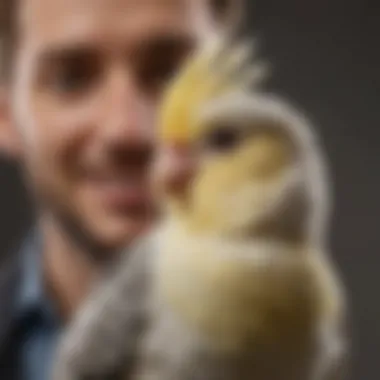
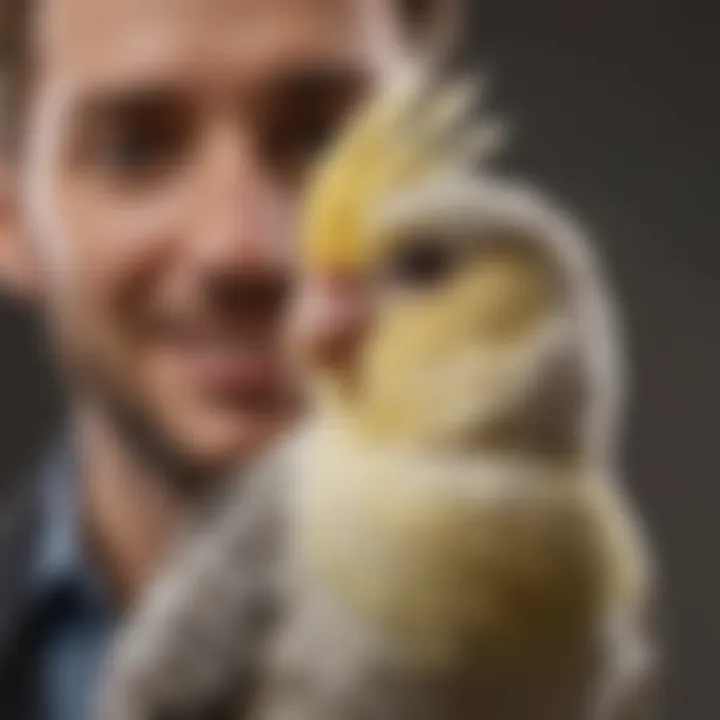
Another appealing aspect is their relative low-maintenance compared to some other pets. Most birds do not require daily walks and can be comfortable in smaller spaces. However, their needs should not be underestimated, as they do require socialization, mental stimulation, and proper nutrition to thrive. Furthermore, the time spent observing their behaviors or providing training can be gratifying for pet owners.
Popular Bird Species for Beginners
Choosing the right bird species is fundamental for any novice bird owner. Understanding which species are suitable for beginners can make the journey of bird ownership more rewarding. The popular bird species for beginners are generally known for their friendly temperaments, manageable care requirements, and social behaviors. This article will delve into specific species, providing insights that help future bird owners select the perfect feathered companion.
Budgerigar: The Friendly Parakeet
Social behavior
Budgerigars, often called budgies, are well-known for their sociable nature. Their friendly disposition makes them an excellent choice for new bird owners. This social behavior enriches the interaction between the owner and the bird. Budgies crave companionship, forming strong bonds with their caregivers.
They are also notorious for being playful and curious. This charisma not only bonds them with their humans but also makes them engaging pets to watch. The strong social tendency of budgerigars also encourages owners to spend time interacting with them. A single budgie may feel lonely, hence, considering having a pair could be beneficial. However, be mindful that having multiple budgies can increase the complexity of their care and require a larger living space.
Care requirements
Budgerigars require basic care that is feasible for most beginners. Their diet needs seeds, fresh fruits, and vegetables. Since they are small birds, they do not need an exceptionally large cage, making them ideal for homes with limited space. Another easy aspect is that budgerigars often can be trained to perform basic tricks.
However, potential owners should note that cleanliness is vital. Keeping their cage, food, and water stations clean is crucial to their health. This ongoing upkeep is necessary, but it simplifies the overall care process since budgies are generally robust birds. They inspire owners to motivate themselves in maintaining cleanliness and engaging in their care.
Common health issues
Budgerigars, while generally healthy, can face certain health issues. Respiratory problems, such as airsac mites, might affect them if their environment is too dusty or dirty. Other common concerns include feather plucking and obesity, often due to a poor diet.
Being aware of these issues helps new bird owners be proactive. Regular check-ups with a veterinarian knowledgeable about avian species can minimize such concerns. These health considerations, while crucial, usually don't deter potential budgie owners due to the overall easy maintenance they require.
Cockatiel: The Charming Companion
Temperament traits
Cockatiels are recognized for their charming demeanor, which makes them a favorite among bird enthusiasts. They usually exhibit calm and friendly traits, which can ease the adjustment period for new owners. Their playful personality fosters an affectionate bond between the bird and the owner. Their ability to mimic sounds and whistles enhances interaction, resulting in a lively atmosphere.
However, their temperament can vary. Some cockatiels might be more reserved, depending on their upbringing. Forcing social interaction isn’t advisable as they thrive in a stress-free environment. An initial period of patience can reveal their true personality.
Living environment
Cockatiels require a spacious cage that allows for movement. A bigger cage with adequate perches for climbing is suitable for their active nature. They enjoy flying, so providing opportunities for safe flight within a confined space is immaculate. Their environment should be safe from direct sunlight and drafts.
Moreover, cockatiels appreciate being included in family activities. A living space where they can interact with family members will significantly improve their day-to-day happiness. Depending on their living situation, additional accessories may be necessary to enrich their environment.
Nutrition and feeding
Feeding cockatiels involves providing a balanced diet. Quality seed mix, pellets, and fresh fruits and vegetables form the core of their nutritional needs. Be vigilant with their diet, as overfeeding can lead to obesity and related health problems.
Offering a variety of foods can encourage them to be active and involved in mealtime. Nutritious feeding habits are essential for overall health and can simplify ongoing maintenance for the owner.
Canary: The Singers of the Bird World
Singing habits
Canaries are known for their exceptional singing abilities, making them delightful companions. Their songs vary significantly, with each breed having distinctive traits. This singing quality can create a soothing background for many families, providing joy throughout the day.
A significant point is that canaries thrive in solitary conditions, which means they do not require companionship to feel secure. This trait makes them less demanding concerning social needs, simplifying care for new owners. However, note that not all canaries will sing consistently; factors like age and environment play a role in their vocal output.
Cage setup
The cage setup for canaries needs to cater to their flying abilities. A wide and tall cage is necessary, allowing them to flutter and express their natural behavior. Bar spacing must be appropriate to ensure their safety.
Accessories like perches and toys should be included, as they enrich the bird's living conditions. A suitable habitat aids in providing a nurturing environment for a canary, making long-term ownership gratifying.
Breeding and care
While many new owners may not focus on breeding, knowing the care requirements is valuable. A good habitat, proper nutrition, and a stress-free environment will support healthy canaries. Breeding can pose challenges and should only be attempted by knowledgeable owners.
The essential point remains that routine care can lead to a fulfilling experience, with the reward of melodious songs. Proper attention extends the lifecycle of healthy canaries wihout needing advanced care skills.
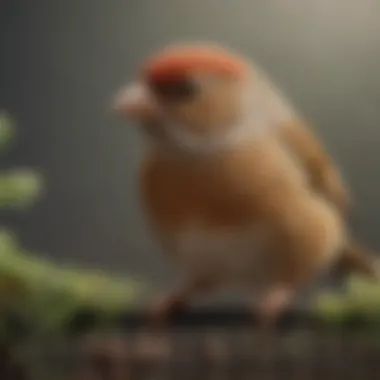
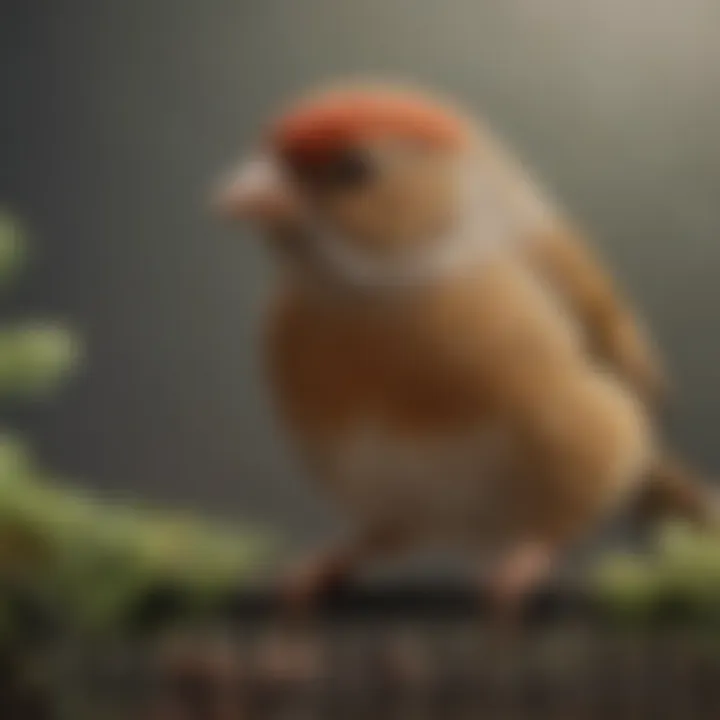
Lovebirds: The Affectionate Affinities
Pairing and social needs
Lovebirds are praised for their affectionate nature, often bonding well with their owners. These social birds thrive in pairs, which makes them genuinely affectionate companions. Their innate need for companionship can lead them to develop strong bonds that provide immense joy. A pair of lovebirds often entertains each other, minimizing loneliness. However, be prepared that they can become territorial if not managed well, particularly during breeding season.
Health maintenance
Routine health maintenance is vital for lovebirds. They require check-ups to monitor any issues, given their propensity for certain health problems like beak and feather disease. A vigilant eye on behavior changes or signs of distress contributes to better outcomes.
Health maintenance is generally straightforward, but it requires some diligence. Owners who are proactive will benefit from their vibrant presence and long lifespan.
Activity level
Lovebirds are active and frollic. They need ample mental and physical stimulation, making them ideal for playful environments. They often require time out of their cage to exercise, and engaging them in activities like training can be gratifying. An active bird is a happy bird, enhancing the bond between the pet and the owner.
Conclusively, while lovebirds require attention, their energetic nature and affection offer a significant return on investment for proper care.
Creating the Optimal Environment
Creating the right environment is vital for keeping birds healthy and happy. Birds, like any pet, require a space that caters to their specific needs. An optimal living environment will allow them to engage in natural behaviors and experience less stress. Such an environment can significantly enhance their well-being and longevity. When selecting how to set up a living space for a bird, one must take into account cage size, arrangement, and available accessories.
Cage Requirements for Small Birds
The size of the cage is one of the most important considerations. Small birds need adequate space to move freely. A larger cage not only provides space for the bird to fly but also allows room for perches, toys, and feeding stations. Moreover, the spacing between bars should be appropriate to prevent the bird from escaping or getting stuck. The structure should be designed to ensure the safety and comfort of the bird. This includes features like rounded corners which helps prevent injury.
It's important to clean the cage regularly as well. A dirty cage can lead to health problems. The use of safe, natural materials makes for a good choice. Birds can be sensitive to chemicals in their environment, so selecting non-toxic materials is crucial.
Essential Accessories and Enrichment
Perches and toys
Perches are necessary for birds' comfort and health. They help birds exercise their feet and can serve as a place to rest. The choice of material is crucial. Natural wood perches provide texture that is beneficial for foot health while offering a more enjoyable experience for the bird. Traditional plastic perches can be slippery, making them less desirable. It’s best to provide varied diameters to promote muscle tone.
Toys, on the other hand, serve multiple roles. They stimulate a bird's mind and help prevent boredom, a common issue among pet birds. Bird-safe toys made from untreated wood or natural fibers are popular as they are safe for chewing. However, care should be taken not to overload the cage with too many toys, which can create stress rather than relieve it.
Food and water stations
Food and water stations should also be well thought out. Clean, fresh water is paramount for a bird's health. A reliable water dispenser helps maintain hygiene. The placement of food dishes should allow birds to access them easily without feeling cramped. There are various types of feeders, including those that prevent waste and minimize mess, which can contribute to a cleaner environment.
Diverse feeding options, such as pellet-based diets mixed with seeds and fresh fruits, ensure that birds receive proper nutrition. Special dishes designed for specific food types can enhance the eating experience and provide mental stimulation.
Cleaning supplies
Regular cleaning supplies are essential for keeping the bird’s environment hygienic. It is important to have bird-safe cleaning agents, as many household cleaners can be toxic to birds. Easy-to-clean surfaces inside the cage make maintenance less of a chore. Using items like paper towels and natural disinfectants can help maintain a safe and healthy habitat.
Birds can be sensitive to odors and residues, so thoroughness in cleaning is key. All areas where your bird spends time need to be kept clean to prevent any health risks.
Tip: Always inspect new items for safety before introducing them to your bird's space, to ensure there are no harmful components.
Feeding Your Avian Friend
Feeding your bird correctly is perhaps one of the most critical aspects of bird care. Just as we need balanced nutrition for our health and well-being, birds also require a specific diet to thrive. A proper diet ensures birds are energetic, healthy, and able to engage in their natural behaviors. Furthermore, proper feeding can prevent various health issues, which ultimately saves time and stress in managing a pet's health. Understanding the nutritional needs of each species is fundamental to their overall care.
Nutritional Needs: Basics
Birds have complex dietary requirements that vary significantly between species. Some key points include:
- Seed mix: While many birds enjoy seeds, a seed-only diet can lead to nutritional deficiencies over time. For example, budgerigars need a mix of seeds alongside fresh vegetables and fruits.
- Fresh greens: Offering leafy greens like kale or spinach can provide essential vitamins. Birds such as cockatiels benefit greatly from these additions in their diet.
- Pelleted food: High-quality pellets are formulated to meet essential nutritional needs. Pellets can serve as a base diet, making feeding easier for the owner and healthier for the bird.
- Varied diet: Each bird species will enjoy different foods. Experimenting with various options can help identify what your bird prefers and require.
It's essential to consult resources on specific diets for each species to ensure all nutritional needs are met.
Common Food Mistakes to Avoid
Feeding birds sounds simple, but there are common pitfalls that even experienced owners might encounter. Awareness of these mistakes can lead to a healthier pet:
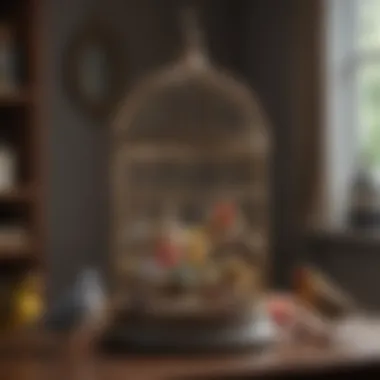
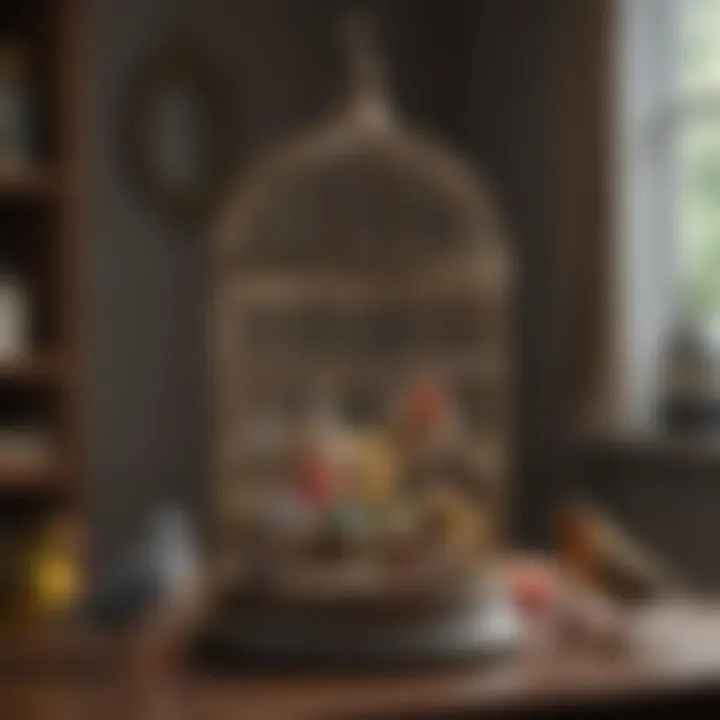
- Ignoring freshness: Outdated seeds or pellets may lose nutritional value. Check expiration dates regularly to maintain a fresh supply.
- Over-reliance on seeds: As mentioned, seeds alone cannot sustain birds. Vary their diet with fruits, vegetables, and specialized pellets.
- Toxic foods: Some foods, such as avocado and chocolate, can be harmful or fatal to birds. Always research before introducing new items into their diet.
- Inconsistent feeding: Schedule feeding times and amounts. Inconsistent feeding can lead to over-eating or under-eating, both of which can be detrimental.
Following these guidelines will ensure a healthful and balanced diet for your avian companion.
Grooming and Maintenance
Grooming and maintenance are vital components of bird care. These tasks not only promote your bird's physical health but also enhance their emotional well-being. Regular grooming habits can prevent health issues and ensure your feathered friend remains lively and energetic.
Basic Grooming Strategies
Bathing habits
Bathing is an essential part of your bird's grooming routine. Birds need to maintain healthy feathers to keep warm and to fly properly. Providing opportunities for your bird to bathe can prevent dryness and the accumulation of dirt or parasites.
Many bird owners use shallow dishes, misting bottles, or sprays designed for birds. This can be pleasing for the bird as they often enjoy splashing around. Some assessments suggest that offering a bath once a week is beneficial, depending on the species. However, overdone bathing can lead to problems like feather disarray or chills. It is prudent to observe your bird and adjust frequency as needed.
Nail trimming
Nail trimming is another critical grooming activity requiring regular attention. Long nails can lead to injuries or difficulty in movement. Most birds won't wear down their nails naturally, making human intervention necessary.
Using bird-safe clippers, you can keep the nails at a comfortable length. Regular trims can help avoid the risk of getting caught on toys or cages. A general guideline is to trim nails every few weeks, but adjustments should be based on individual growth rates. Taking it slow can be beneficial so that your bird does not become stressed during the process.
Feather care
Feather care goes hand in hand with the overall maintenance of your bird's grooming. Healthy feathers are a sign of your bird’s well-being. Regular preening helps to keep feathers clean and aligned. As a bird owner, you can assist in this process.
Encouraging preening through play is one strategy. Additionally, providing high-quality nutrition can strengthen feather health. Unique treatments, such as specific shampoos, may help in certain cases. However, it's essential to consult a veterinarian if you notice excessive feather loss or other unusual behaviors.
Signs of Illness to Monitor
Monitoring for signs of illness is crucial in bird ownership. Birds are adept at hiding their discomfort, making early detection challenging. Some common signs include a change in appetite, feather picking, or changes in vocalizations. Always pay attention to behavioral changes, such as increased lethargy or isolation. Establishing a routine check for these symptoms can aid in early intervention and prevent serious health conditions.
Regular health monitors and timely veterinary consultations can significantly influence the quality of life for your bird.
Building a Bond with Your Bird
Creating a strong connection with your avian companion is crucial. A healthy bond fosters trust and security in birds, leading to better social interactions and overall well-being. Birds are social creatures and thrive on companionship. Understanding their needs is essential for forming a lasting relationship.
Interactive Play and Socialization
Socializing with your bird is a fundamental part of nurturing companionship. Birds need mental stimulation and social interaction. Engaging in active play can reduce boredom and stress. Activities like playing with toys, or simply talking can greatly enhance their life. Regular interaction also helps to improve their emotional health. Allowing your feathered friend out of their cage encourages exploration and confidence.
Training Basics for Birds
Training your bird is not just about teaching tricks. It's about reinforcing positive behaviors and enhancing communication. A well-trained bird is typically happier, more confident, and less prone to behavioral issues. Incorporate simple training methods into your daily routine. This reinforces your bond and helps your bird learn essential habits.
Positive reinforcement techniques
Using positive reinforcement helps birds associate good behavior with rewards. This technique involves giving treats or praise for desired actions. Birds respond well to this method because it creates a positive experience. One key characteristic of positive reinforcement is its ability to motivate birds through rewards. However, consistency is critical. Not reinforcing behaviors sporadically may confuse them.
Communicating effectively
Effective communication with your bird fosters understanding. Birds have different cues that indicate their needs or feelings. Recognizing these cues helps you respond appropriately. One vital aspect of communication is being observant. This observation leads to a smoother interaction with your pet. Establishing a mutual language enhances your bond. It can also reduce stress for both you and your bird, making it a crucial part of fostering a healthy relationship.
Building a connection with your bird not only improves day-to-day interactions but contributes to long-term happiness for both the bird and owner.
Epilogue: The Joys of Avian Companionship
Caring for birds can be a rewarding experience that brings uniqueness to any home. Throughout this guide, we have explored various bird species that are particularly suitable for beginners, outlining their specific needs, social behaviors, and care requirements. It becomes clear that choosing the right species is essential for any potential bird owner aiming to foster a successful relationship with their feathered companions.
One of the primary joys of avian companionship is the connection that builds over time. Birds exhibit a range of personalities, which can lead to a fulfilling interaction unlike many other pets. Engagement with a bird enhances not only the bird's well-being but also enriches the owner’s life. They can become delightful friends that offer companionship, charm, and sometimes, vocalizations that bring joy into the household.
When introducing a bird into your life, it is also important to consider the commitment involved. Birds require regular social interaction and mental stimulation. Owners should prioritize bonding activities such as playtime or basic training to strengthen this connection. Mistakes in this area can lead to stress for both the bird and owner. Reading about species characteristics can aid in choosing an ideal bird that matches one’s lifestyle and expectations.
Given the unique and critical needs of avian friends, their housing, diet, and maintenance play a significant role in ensuring happiness and health. Creating an optimal environment includes selecting the correct cage size, a proper diet, and suitable toys that enable mental and physical stimulation. Without attention to these details, the relationship can become strained. Therefore, understanding the needs of the chosen bird can prevent future complications and foster a smoother transition into domestic life.
Ultimately, the companionship of birds presents an enriching aspect of pet ownership. Those who invest time and love into their feathered friends will likely find themselves appreciated in return, as the bond formed translates to a happier and healthier pet. The joys derived from avian companionship are profound, and through detailed care, communication, and commitment, one can experience the fulfilling adventure of bird ownership.
"Birds are not just pets; they are companions that open a window to understanding life in their vibrant and expressive ways."
As you embark on your journey as a bird owner, keep in mind the elements that contribute to a healthy and happy relationship. Use this guide as a trusty resource to navigate the realms of avian care, and enjoy the growth and joy that comes with it.







